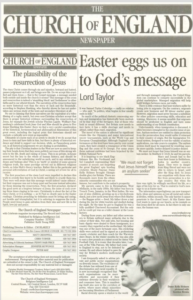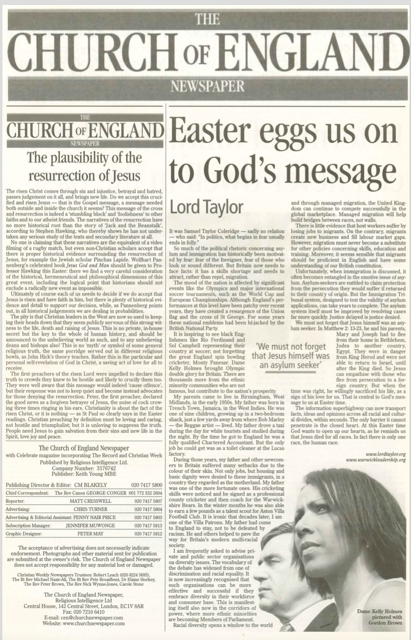Church of England Article By Lord Taylor of Warwick
 It was Samuel Taylor Coleridge – sadly no relation – who said: “In politics, what begins in fear usually ends in folly”
It was Samuel Taylor Coleridge – sadly no relation – who said: “In politics, what begins in fear usually ends in folly”
So much of the political rhetoric concerning asylum and immigration has historically been motivated by fear: fear of the foreigner, fear of those who look or sound different. But Britain now needs to face facts: it has a skills shortage and needs to attract, rather than repel, migration.
The mood of the nation is affected by significant events like the Olympics and major international soccer tournaments, such as the World Cup and European Championships. Although England’s performances at this level have been patchy over recent years, they have created a resurgence of the Union flag and the cross of St George. For some years these national emblems had been hi-jacked by the British National Party.
It is inspiring to see black Englishmen like Rio Ferdinand and Sol Campbell representing their country at soccer, not forgetting the great England spin bowling cricketer, Monty Panesar. Dame Kelly Holmes brought Olympic double glory for Britain. There are thousands more from the ethnic minority communities who are not famous, but contribute to the nation’s prosperity
My parents came to live in Birmingham, West Midlands, in the early 1950s. My father was born in Trench Town, Jamaica, in the West Indies, He was one of nine children, growing up in a two-bedroom shack, just a few yards away from where Bob Marley – the Reggae artist – lived. My father drove a taxi during the day for white tourists and studied during the night. By the time he got to England he was a fully qualified Chartered Accountant. But the only job he could get was as a toilet cleaner at the Lucas factory.
During those years, my father and other newcomers to Britain suffered many setbacks due to the colour of their skin. Not only jobs, but housing and basic dignity were denied to these immigrants, in a country they regarded as the motherland. My father was one of the more fortunate ones. His cricketing skills were noticed and he signed as a professional county cricketer and then coach for the Warwickshire Bears. In the winter months he was also able to earn a few pounds as a talent scout for Aston Villa Football Club. It is ironic that decades later, I am one of the Villa Patron. My father had come to England to stay, not to be defeated by racism. He and others helped to pave the way for Britain’s modern multi-racial society.
I am frequently asked to advise private and public sector organisations on diversity issues. The vocabulary of the debate has widened from one of discrimination and racial equality. It is now increasingly recognized that such organisations can be more effective and successful if they embrace diversity in their workforce and consumer base. This is manifesting itself also now in the corridors of power, where more ethnic minorities are becoming Members of Parliament.
Racial diversity opens a window to the world and through managed migration, the United Kingdom can continue to compete successfully in the global marketplace. Managed migration will help build bridges between races, not walls.
There is little evidence that host workers suffer by losing jobs to migrants. On the contrary, migrants create new business and fill labour market gaps. However, migration must never become a substitute for other policies concerning skills, education and training, Moreover, it seems sensible that migrants should be proficient in English and have some understanding of our British constitution.
Unfortunately, when immigration is discussed, it often becomes entangled in the emotive issue of asylum. Asylum-seekers are entitled to claim protection from the persecution they would suffer if returned to their country of origin. But the Immigration Tribunal system, designed to test the validity of asylum applications, can take years to complete. The asylum system itself must be improved by resolving cases far more quickly. Justice delayed is justice denied.
We must not forget that Jesus himself was an asylum seeker. In Matthew 2: 13-23, he and his parents, Mary and Joseph had to flee from their home in Bethlehem, Judea to another country, Egypt. They were in danger from King Herod and were not able to return to Israel, until after die King died. So Jesus can empathise with those who flee from persecution to a foreign country. But when the time was right, he willingly sacrificed his life, as a sign of his love for us. That is central to God’s message to us at Easter time.
The information superhighway can now transport facts, ideas and opinions across all racial and cultural divides, within seconds. The only barrier it cannot penetrate is the closed heart. At this Easter time God wants to open up our hearts, as he reminds us that Jesus died for all races. In fact, there is only one race, the human race.
